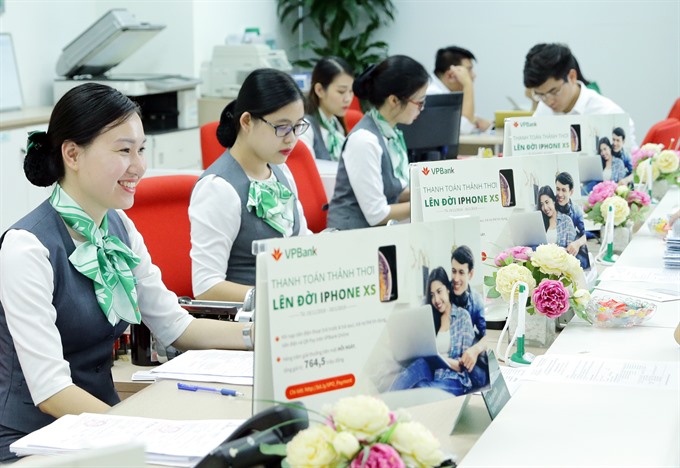Viet Nam Prosperity Joint Stock Bank (VPBank) posted a pre-tax integrated profit of VND9.2 trillion (US$396.4 million) in 2018, representing a 13 per cent year-on-year increase.

Viet Nam Prosperity Joint Stock Bank (VPBank) posted a pre-tax integrated profit of VND9.2 trillion (US$396.4 million) in 2018, representing a 13 per cent year-on-year increase.
VPBank last year earned a total consolidated income of more than VND31 trillion, increasing 24.2 per cent from the previous year. With the results, the bank continued to affirm its role as one of the most effective credit institutions. It took fourth position among the most profitable banks, following Vietcombank, Techcombank and BIDV.
The State Bank of Viet Nam in 2018 maintained its policy of stabilising the macroeconomy and ensuring safety of lending activities. It therefore continued to set a credit growth quota for banks.
VPBank was approved a quota of 17 per cent and its subsidiary – FE Credit of 20 per cent, lower than its set targets, thus partly affecting its profit.
The bank’s operational efficiency remained at a very high level in terms of total assets and equity. By the end of 2018, total consolidated assets were VND323.3 trillion (up 16.4 per cent), equity of VND34.7 trillion, outstanding loans reached VND230.3 trillion (up 17.1 per cent), and capital mobilisation of over VND219.5 trillion (up nearly 10 per cent). Return on assets (ROA) and return on equity (ROE) were 2.5 per cent and 22.9 per cent, respectively. Net interest income ratio (NIM) continued to be kept at the highest level of 9 per cent in the market.
Meanwhile, the Cost Income Ratio (CIR) continued to improve at 34.2 per cent, in comparison with 35.5 per cent of 2017.
The bank’s individual profit (excluding its subsidiaries’ profit) reached approximately VND5.1 trillion, an increase of over 31 per cent compared to the previous year and accounted for more than 55 per cent of the bank’s consolidated profit. Total operating income of the bank also achieved a high growth rate of 29 per cent compared to 2017, reaching more than VND17.7 trillion.
The majority of the bank’s revenue came from interest rates through lending to its strategic segments such as consumption finance, individual customers, household businesses, and small-and-medium sized enterprises. Income from fees also contributed to the bank’s results last year as total fee income reached more than VND3.8 trillion, up 19 per cent from previous year.
The results were thanks to promoting insurance, credit cards and digital banking services. The increased fee income also meant that the bank’s dependence on traditional lending products has been reduced and it has diversified its services.
VPBank said it submitted an application to the central bank to apply Basel II standards in 2019. So far, there have been three banks recognised as conforming to Basel II before the deadline including Vietcombank, VIB and OCB.
It has been one of the banks regularly announcing financial reports under International Financial Reporting Standards (IFRS).
The bank last year increased its investment in digital banking and the individual customer segment. It launched an innovative digital bank for the young generation named “YOLO” and $NAP of FE Credit. YOLO is expected to create the first digital banking ecosystem in Viet Nam while $NAP brings an automatic lending process. Together with other digitalisation services, YOLO and $NAP are expected to provide new growth momentum for VPBank in the future. — VNS





